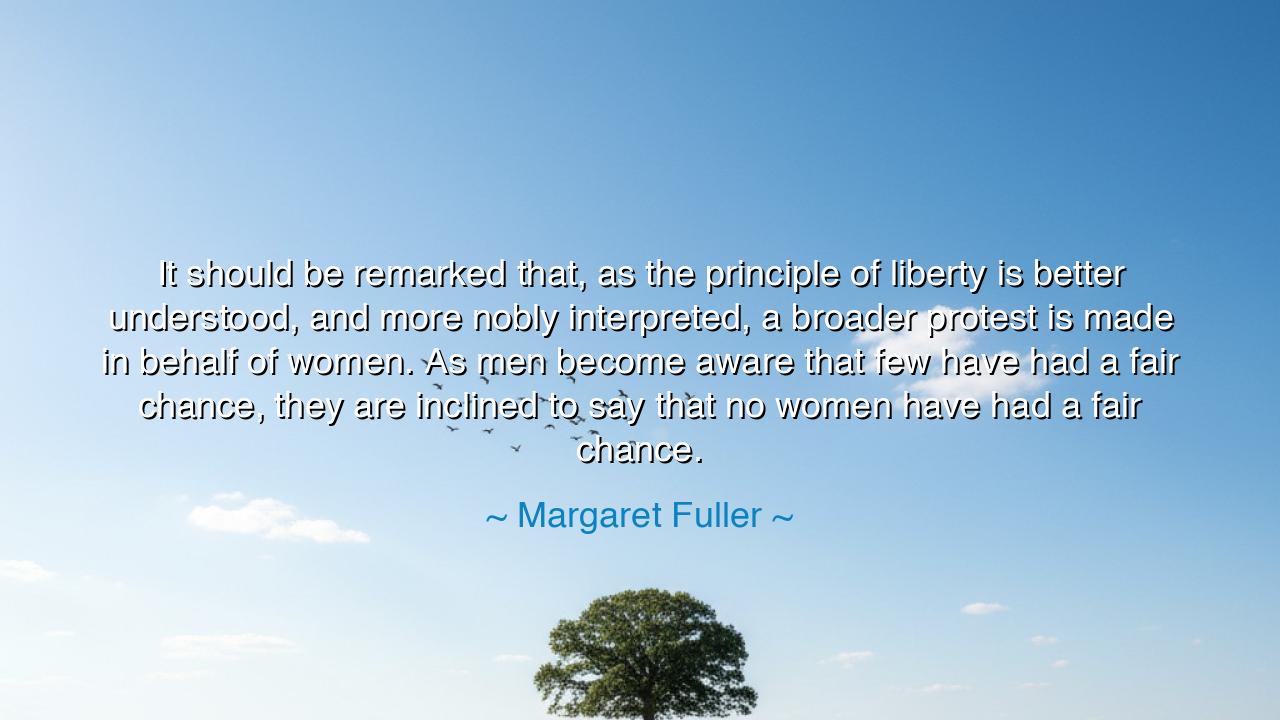
It should be remarked that, as the principle of liberty is better
It should be remarked that, as the principle of liberty is better understood, and more nobly interpreted, a broader protest is made in behalf of women. As men become aware that few have had a fair chance, they are inclined to say that no women have had a fair chance.






"It should be remarked that, as the principle of liberty is better understood, and more nobly interpreted, a broader protest is made in behalf of women. As men become aware that few have had a fair chance, they are inclined to say that no women have had a fair chance." These words by Margaret Fuller resonate with the deep, emotional recognition of the principle of liberty, not only as it applies to men but as it should also extend to women—a group historically denied full access to the opportunities that life offers. Fuller’s statement reflects the growing awareness in society that the struggles of women are not isolated or individual, but part of a broader injustice that calls for a collective response. As the idea of liberty evolves, so too must our understanding of its application, especially to those who have long been overlooked or marginalized.
In the ancient world, the concept of liberty was not just about freedom from oppression, but about the right to self-determination—to speak one’s truth, to pursue one’s destiny, and to be acknowledged as an equal. Athens, as the birthplace of democracy, held the idea of liberty in high regard, but it was a liberty that was limited to a select group—male citizens. Women, slaves, and foreigners were excluded from the political life of the city. Despite their wisdom, Socrates and Plato rarely considered the role of women in the civic life they championed. Full participation in the concept of liberty—the ability to speak, to act, to influence—was reserved for men. It is here that Fuller’s critique finds its root: while liberty was lauded as the pinnacle of freedom, it was not extended to all, particularly women, who were denied the fair chance to participate in the shaping of their own destinies.
Consider the ancient figure of Antigone, the defiant sister in Sophocles' tragedy, who dared to stand up for what she believed was right, even in the face of patriarchal authority. Antigone’s story is a tale of resistance against the restrictions placed upon her as a woman. She sought to give her brother a proper burial, even when the king—her uncle—ordered it forbidden. Antigone’s actions are not just those of familial love, but a protest against the oppression of women in a society that denied them equal voice and equal power. Her struggle embodies the noble protest Fuller refers to: the act of demanding the chance to be heard, to act freely, and to claim a space in the world that had long been denied to her kind.
In more modern history, we find the struggle of Susan B. Anthony and Elizabeth Cady Stanton, pioneers of the American suffrage movement. These women, like Antigone, recognized the injustice of a society that denied them the basic right to vote, the very freedom that defined American identity. Anthony and Stanton, much like Fuller, understood that as men began to realize the limitations of their own liberty, they would recognize the denial of opportunities for women. Their movement was not just about the right to vote, but about ensuring that the principle of liberty was truly universal—that it was not a privilege reserved for only half of the population.
Fuller’s words point to the growth of awareness—how, as men understand the injustice women face, they are more inclined to advocate for women’s rights. This shift in perspective is a key turning point in history, as it moves from individual struggle to shared recognition of systemic inequality. As modern society evolves, we continue to see the powerful influence of men and women alike fighting for equality, realizing that the liberty of one cannot be fully realized until the liberty of all is guaranteed. The fight for gender equality has been a long march, one in which men and women are beginning to see that no one is truly free until all are free.
The lesson in Fuller’s quote is both profound and urgent. It asks us to reflect on the true meaning of liberty—that freedom is not simply the absence of oppression, but the presence of equal opportunity for all. As society continues to progress, we must ask ourselves: who are we leaving behind? Are we ensuring that every individual—regardless of gender, race, or background—has the chance to thrive? The fight for gender equality is not merely the responsibility of women but of all who believe in the principles of justice and liberty.
As we consider this lesson, let us commit ourselves to the cause of equality. Advocate for those who are denied the chance to speak, to act, to rise, and to claim their place in the world. Like Socrates, let us not be satisfied with half-truths and half-freedoms but strive for a world where true liberty is a universal condition. Just as Antigone, Susan B. Anthony, and Margaret Fuller took action against the restrictions placed upon them, we too must stand against the injustices that remain in our own time. For liberty, when shared, is the foundation of a just and prosperous society.






AAdministratorAdministrator
Welcome, honored guests. Please leave a comment, we will respond soon